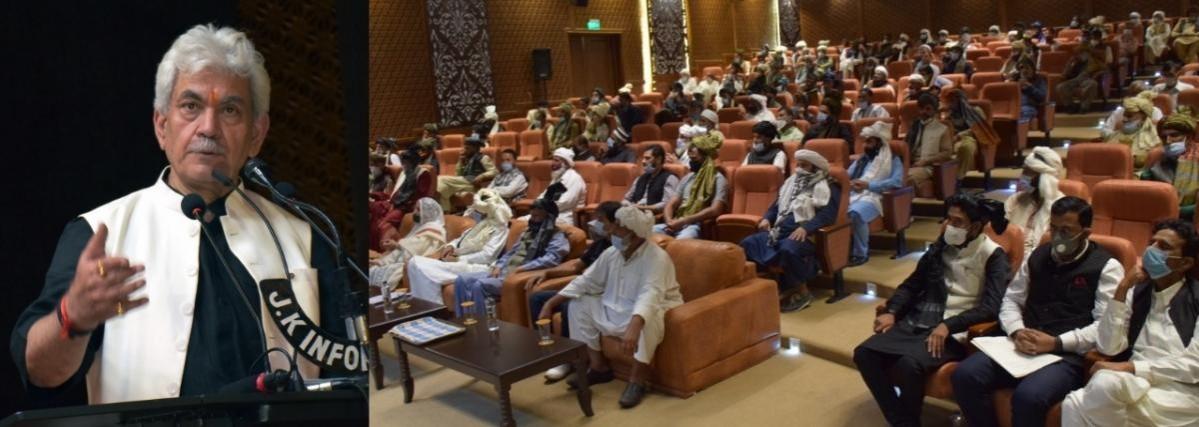In a historic step, the Jammu and Kashmir government is going to hand over rights to the tribals under the Forest Rights Act on Monday. This announcement was made by Lieutenant Governor Manoj Sinha while interacting with a delegation of the Gujjar-Bakerwal community along with members of the Gaddi-Sippi community.
This interaction was held to take a firsthand appraisal of the various ongoing schemes and initiatives for the development of tribal communities of J&K and to discuss their concerning issues.
Observing that full rights were not extended to tribals of J&K earlier, the Lt Governor said that for the first time we have tried to bring the light of development in the lives of lakhs of tribal families by implementing the Forest Rights Act. The Lt Governor said that the tribal communities will be getting rights over minor forest produce.

The UT government in coordination with the Tribal Cooperative Marketing Development Federation of India Limited (TRIFED) will establish infrastructure for collection, value addition, packaging, and distribution. Further, to empower the youth and women a cluster of 15 tribal SHGs will be established and Rs 15 lakh will be provided per group.
Development of tribals a priority of J&K Govt
"Development of Tribal communities of J&K is one of the top priorities of the government and for the first time in the history of J&K, we are going to roll out the handing over of rights under the Forest Rights Act from the coming Monday," the Lt Governor announced.
Recalling his previous interaction with a 70-member delegation of the tribal community in which detailed discussions were held on development, education, and other issues of tribal population, the Lt Governor observed that the government has taken many unprecedented decisions for the development and upliftment of the tribal population, besides contemplating a host of other initiatives in that direction.
"To implement an overarching plan for the development of tribal communities, a two-month-long survey has been conducted for effective policymaking based on ground realities", he said.

1500 mini sheep farms for tribal youth
On the issue of ensuring a sustainable livelihood for the youth belonging to the tribal communities, the Lieutenant Governor announced the establishment of 1500 mini sheep farms, which will provide employment opportunities to 3000 youth in this financial year. The program will not be a one-time initiative and every year 33% of new sheep farms will be established.
The Lt Governor noted that 'Mission Youth' along with Tribal Department has started the process of setting up 16 Milk Villages to connect at least 2000 youth to the dairy sector at the cost of Rs 16 crore, besides providing training, branding, marketing, and transport facilities to the youth.
STs empowered politically after the abrogation of Article 370
First time in the history of J&K, the political reservation was granted to STs in ULBs and Panchayat elections. J&K is the only state in northwest India having a share of nearly 15 percent population of STs. As per the 2011 census, the total population of STs in J&K counted 14.9 lakh among them 13.2 lakh are Muslim, 1 lakh are Buddhist and about 67,000 Hindu.
After decades-long struggle tribes of the erstwhile state of J&K were granted ST status in the year 1991 when the state was under the Governor's rule. In J&K, four communities, namely Gujjar, Bakarwal, Gaddi, and Sippi were notified as the Scheduled Tribes vide the Constitution (Scheduled Tribes) Order (Amendment) Act, 1991.
Since 1991, STs were agitating to get a political reservation in J&K like other parts of the country. It was only after the abrogation of Article 370, their demand was fulfilled.
- Transit accommodations to come up at 8 places at an estimated cost of Rs 28 cr.
- Tribal Bhavans to come up at Jammu, Srinagar and Rajouri
- A cluster of 15 tribal SHGs will be established to empower the youth and women
- 1500 mini sheep farms to be established, 16 milk villages worth Rs 16 cr to be set up for ensuring the sustainable livelihood of tribal youth.
- Initially, 500 tribal youth to be selected for specialized skill development programmes including Commercial Pilots, Management, Robotics, etc.
- Scholarships worth Rs 30 crore are given to tribal children; this year 42,000 additional children will be provided with the scholarship.
- 1521 seasonal schools for migratory children, two residential schools on the migratory route, and 8000 E-learning tablets for 7th and 8th-grade tribal students.







!['Lip lock, pressure, pyaar': Vidya Balan- Pratik Gandhi shine in non-judgmental infidelity romcom Do Aur Do Pyaar [ Review]](https://data1.ibtimes.co.in/en/full/797104/lip-lock-pressure-pyaar-vidya-balan-pratik-gandhi-shine-non-judgmental-infidelity-romcom.jpg?w=220&h=138)








